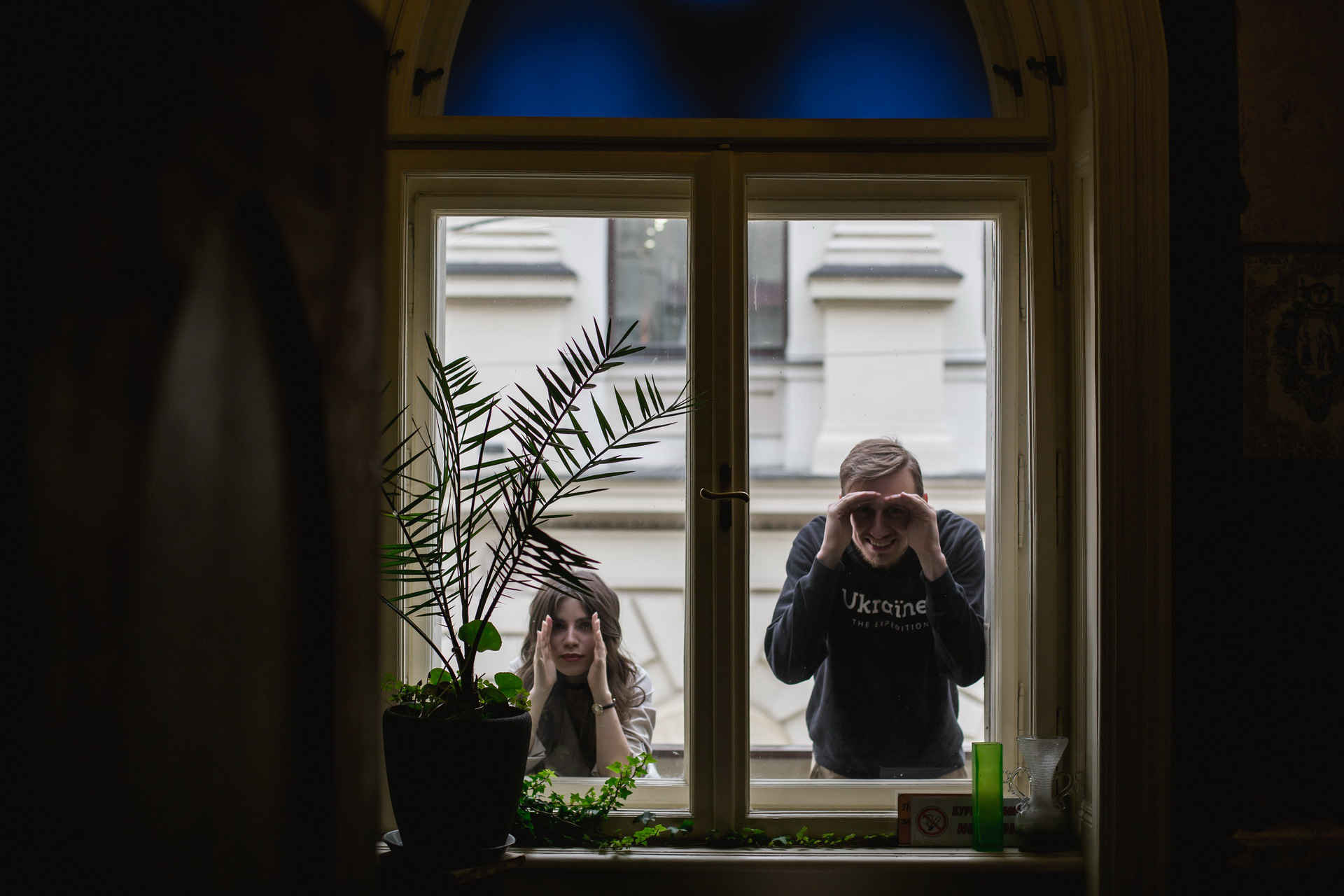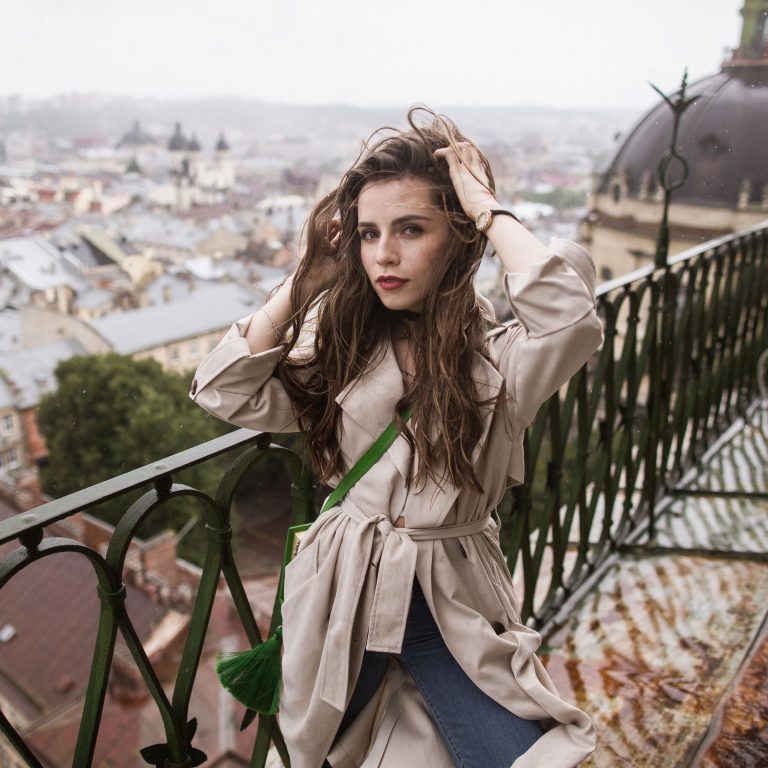In this series, we continue our journey around Ukraine in the company of famous Ukrainians, each of whom will be showing us their hometown from their own unique perspective. In our second story, singer Khrystyna Soloviy shows us her native Lviv: a city where it seems to be raining all the time; a city which leaves no one indifferent. People come here to admire the architecture while enjoying a cup of coffee, or to visit one of the numerous festivals. We, in turn, will try to show you a lesser-known side of the city. Our heroine will be strolling along the narrow streets of Lviv together with the founder of the Ukraїner project, Bogdan Logvynenko.
— What are we going to see today?
— I don’t even know how to define it, to make it into a themed tour. I guess it will be about my favourite places. And the first location is the monument to Ivan Fedorov. When I first saw him, I thought this man was Lviv himself.
— Why is that?
— First of all, it’s due to my fondness for books and how much time I spent here in my student years, how much of my scholarship money I spent here, and how many friends I found here among the booksellers. But it looks like the rain scared them away, and they aren’t here now. Still, I’ll tell you about my favourite places anyway.
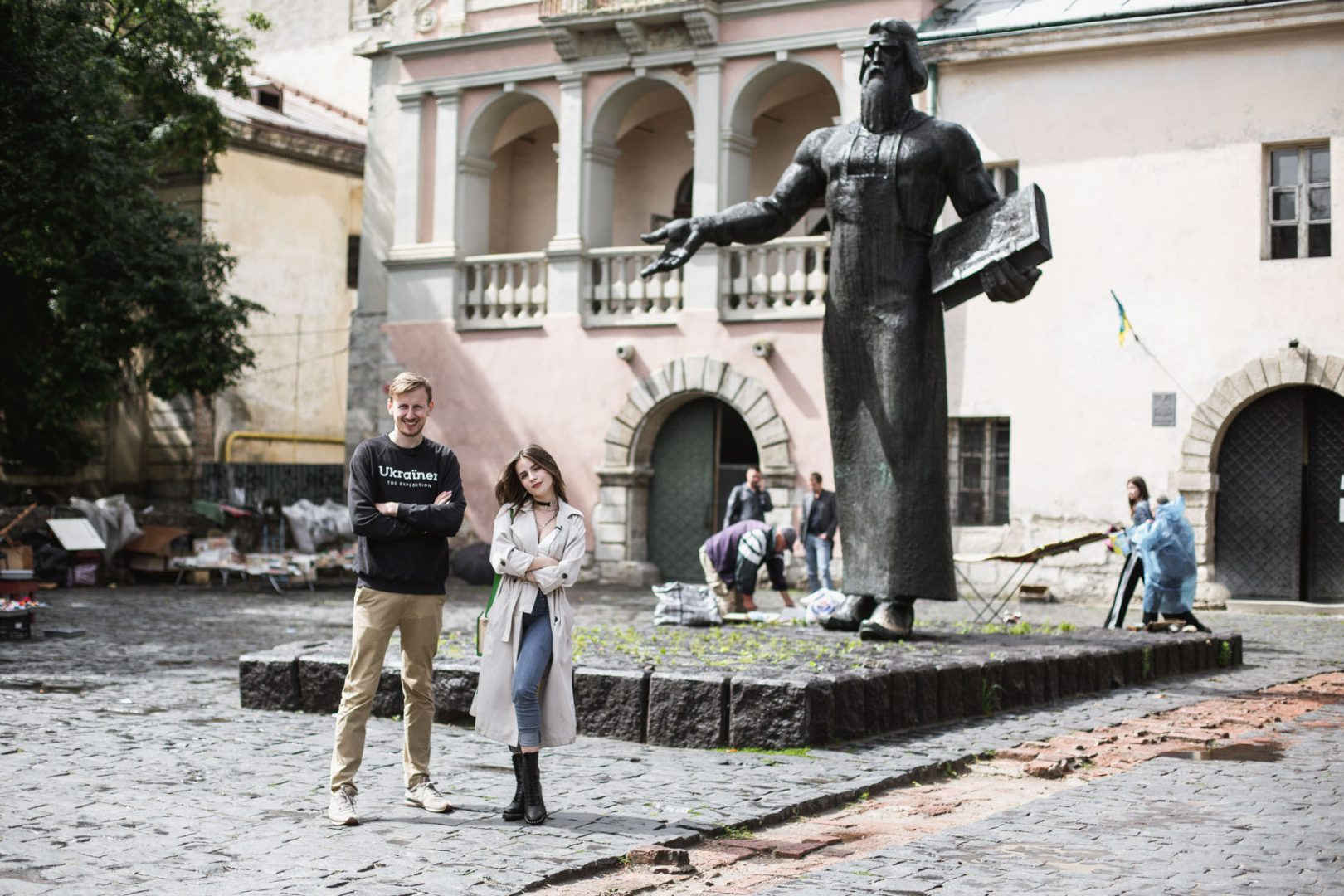
— What was the coolest book that you found here? Do you remember?
— It was here that I found most of the editions of Nabokov’s Lolita. Now I have more than fifteen of them, but my collection still isn’t complete. I have a friend here called Dmytro, who often finds something interesting for me, even if I’m not in Lviv.
— Shall we check out the vinyls? Maybe we can find something we know.
— But there are very few of them today. The last one I remember I found here with my friend. Actually, he found it, and I just borrowed it to listen. It was an edition of the Marenych Trio, a very beautiful one.
— And here they have a whole shelf with Vysotskiy (Soviet singer and poet – tr.).
— You see. Oh! Sofia Rotaru (Soviet and Ukrainian singer – tr.). Well, this isn’t her best vinyl cover. But I really like the way she looked, her overall image.
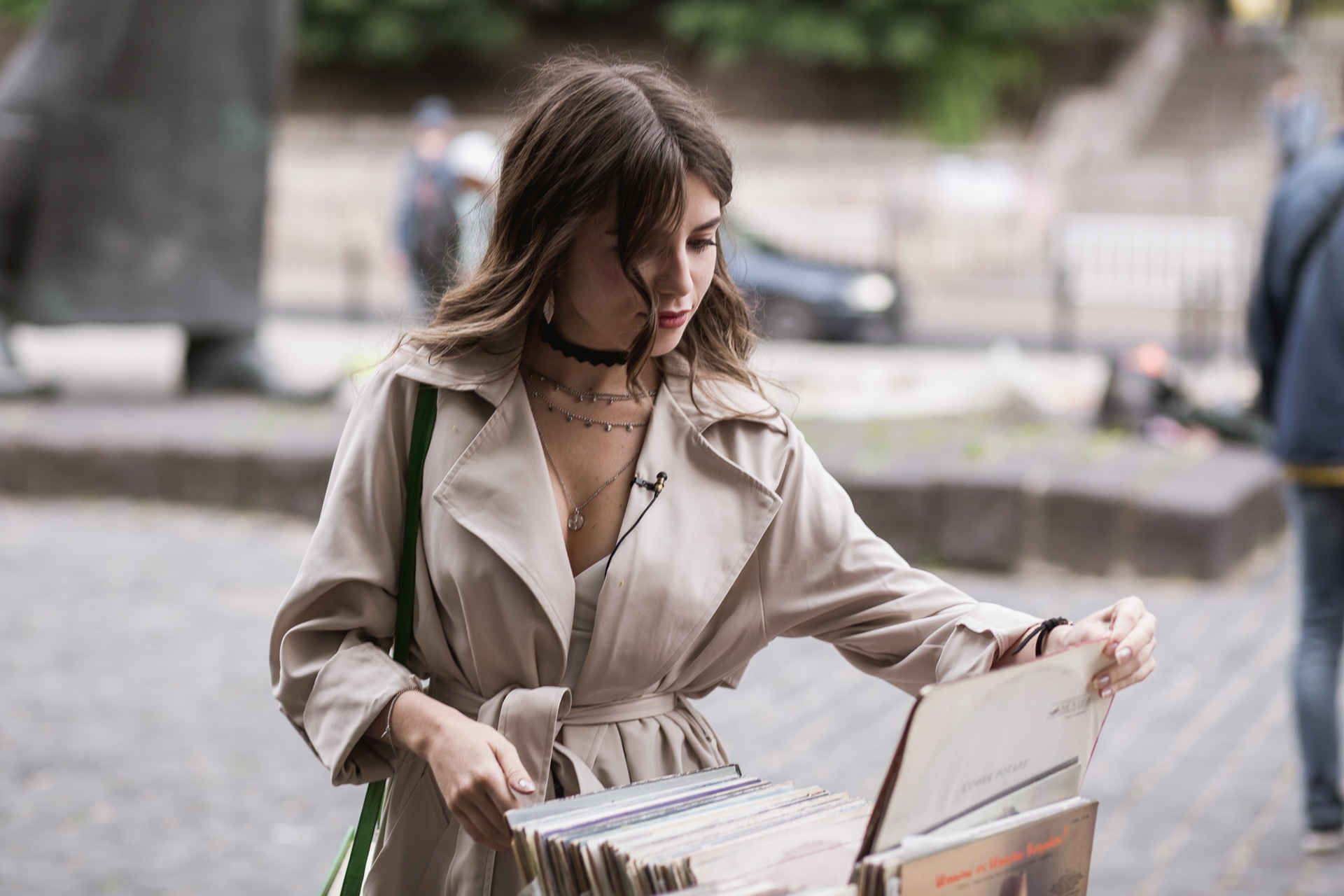
— Are the covers of your albums your ideas?
— The idea for the last cover came from my manager, who’s not working with me now. Andrii Balan. He came up with the whole concept, which I didn’t even want to change — neither on the poster, nor on the album, nor on YouTube or iTunes. I might seem angry and over-the-top to some people on there, but that’s the way I am sometimes. I have nothing to hide, I’ve got to show everything.
— Have you been smoking from a young age?
— No, not from a young age, but I kind of smoked occasionally. I was always hanging around bohemian types. I felt like being this way — holding a cigarette.
— And how did you move to Lviv?
— Well, it made sense for us at that time. I had finished high school, my brother had been studying at the Polytechnic for a while already, so there wasn’t really anything keeping us in Drohobych. After I started studying at the Faculty of Philology, it happened step by step: Mum first brought Grandma, and then we moved here properly.
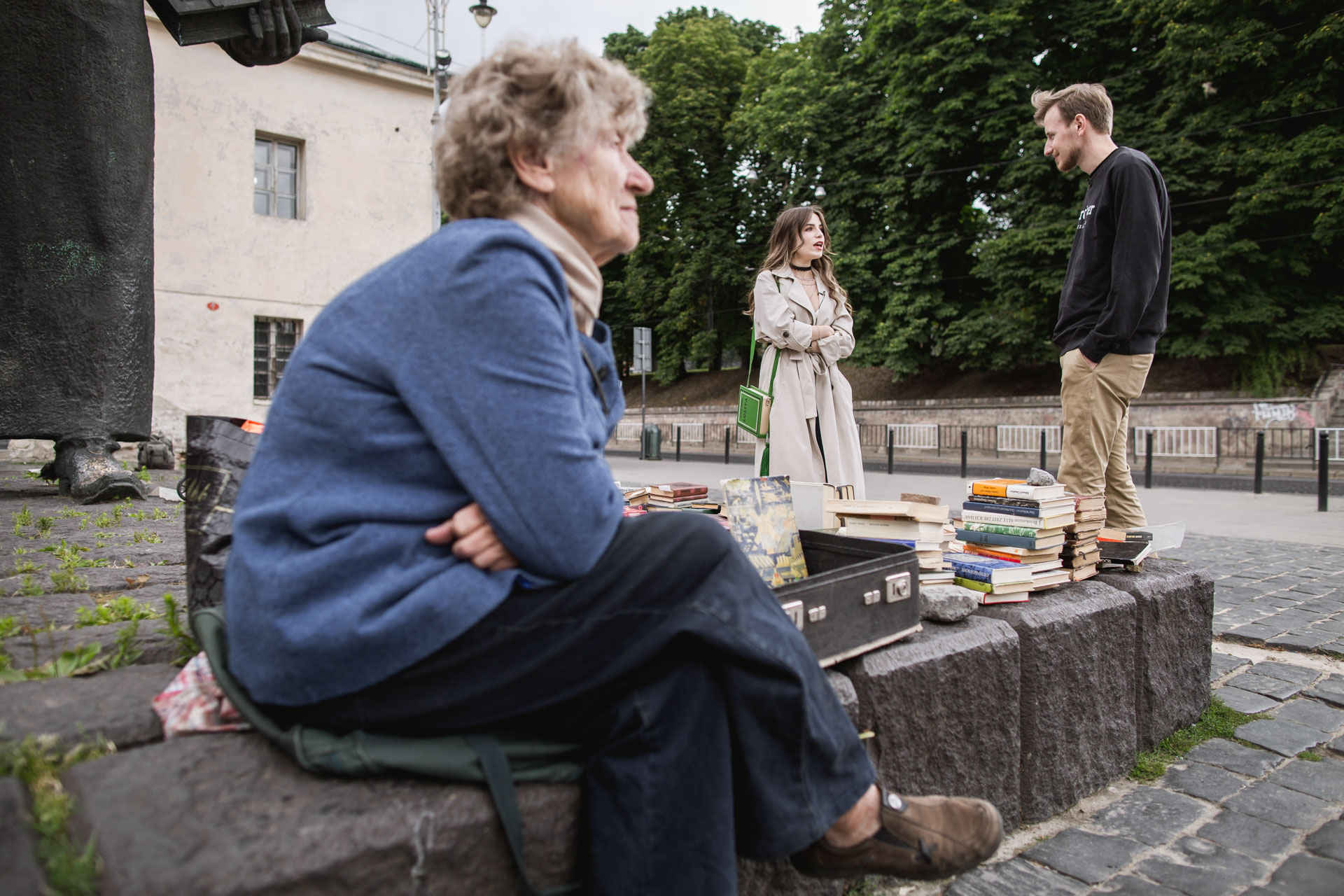
— You mean for some time your parents lived here, and then you and your grandma moved here from Drohobych.
— No, it wasn’t like that. Quite the opposite: my mum was taking care of the move, while I was already living at my aunt’s on Sheptytskykh Street. Right near my beloved Church of Sts. Olha and Elizabeth, formerly called Kościół św. Elżbiety in Polish. And, well, I was here practically on my own. And that’s the best thing that could have happened to me after I moved from Drohobych to Lviv. Because I think it’s our environment that shapes our personality. And what was happening to me here, the people I was talking to, who I met, what I absorbed — all this is still inside of me. Kyiv didn’t give me this feeling — of a new environment, a new city. I mean, I’m using my background from Lviv and I’m trying to keep it and preserve it in Kyiv.
— What’s missing for you in Kyiv, in contrast with Lviv?
— I don’t know, it seems a matter of habit, and it’s my comfort zone. I’m transferring all that time and space, and cultivating it there. But I don’t go out so much in Kyiv as I used to in Lviv.
My apartment, its interior, is very Lviv-like. The Lviv furniture, piles of books, piles of vinyls, and this whole atmosphere — it’s kind of like my fortress, you know.
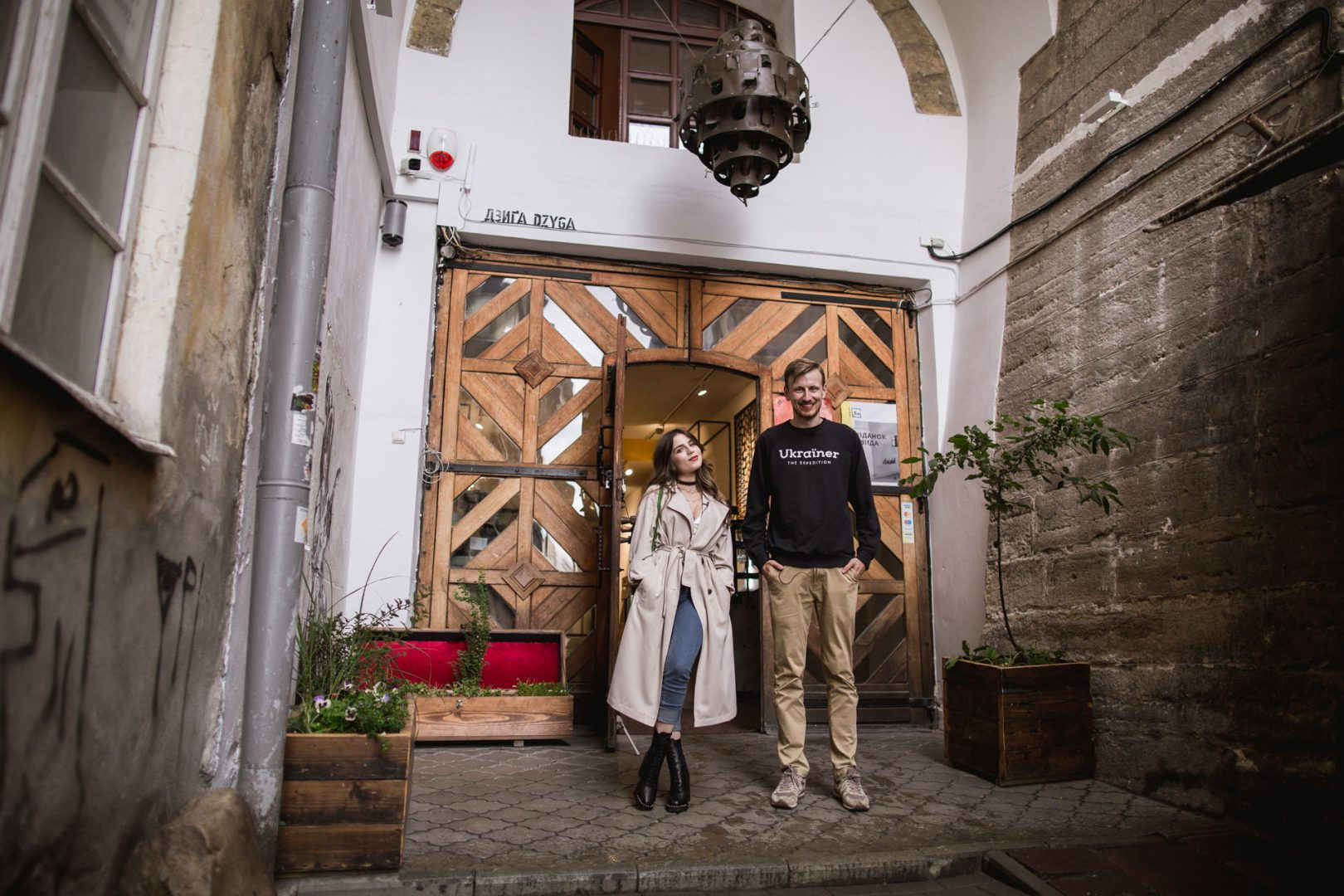
Art community Dzyga, whose gallery is located in a former Dominican monastery, has been a hub for local initiatives since the early 1990s. This movement gives life to ideas, projects and art events which resonate far outside Lviv and Ukraine. Dzyga supports, produces, and contributes to the development of various genres of modern art, and thus has become an experimenting-ground for young artists, as well as an open space for the understanding of art.
— How did it become your favourite?
— You know, it was from the first time. I think all my friends can agree with me, and it’s actually their favourite place too. I don’t remember who brought me here. It must have been some kind of a literary event. I was in my first year at university, and Oleh Lysheha (a poet — tr.), was still alive. I reckon that was the first time I came here, but then everything was completely different.
— Do you like modern art?
— I’m very cautious about modern art and the perception of it. So I can’t answer your question. Depends on the piece, I guess.
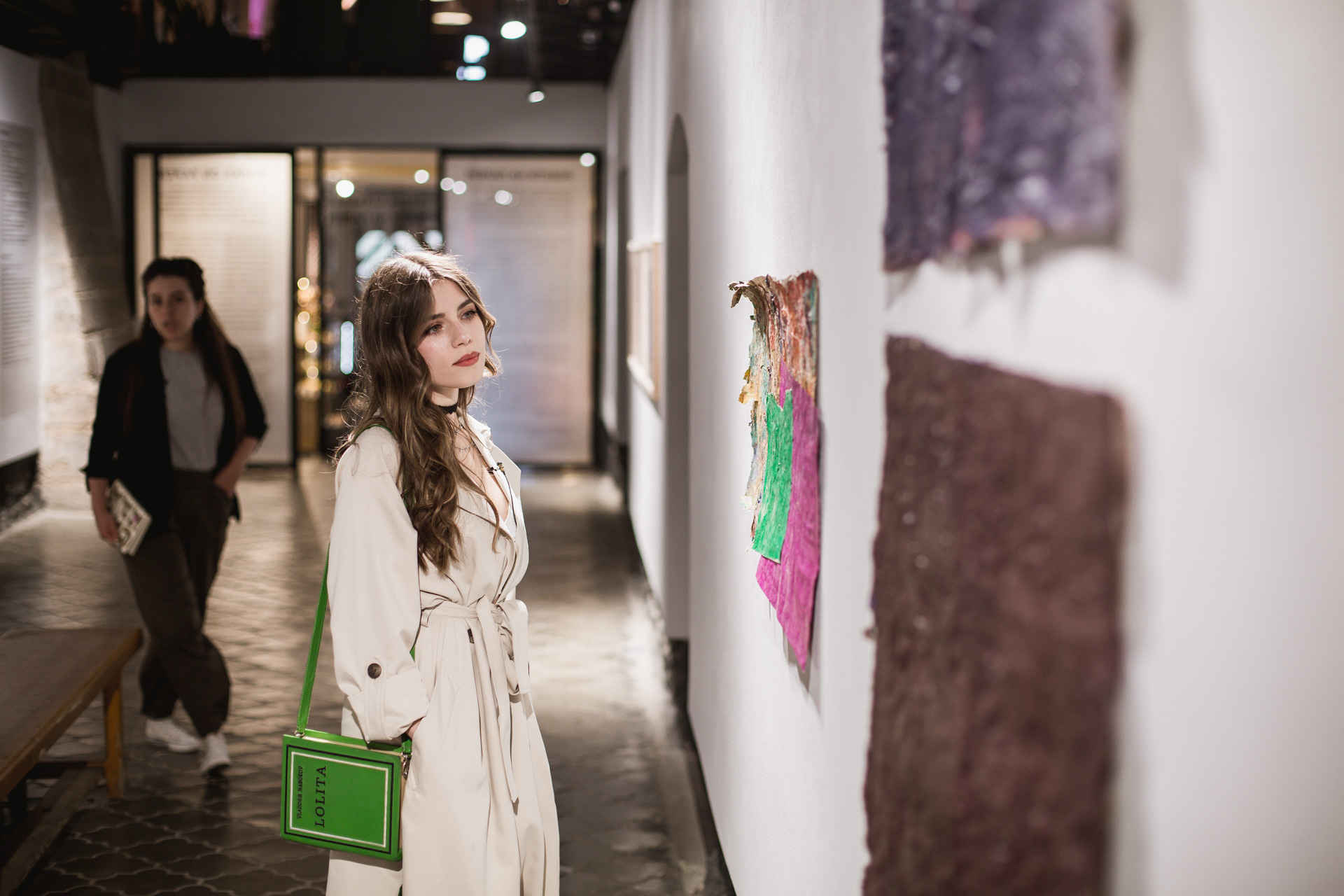
— Are there any posters for your performances here?
— Oh, I don’t know. I don’t think there were any posters back then. It was long before my story with The Voice. I was on stage with some band associated with Ostap Kostiuk’s ethno club. And there was a project — it still exists — called Lemko Bluegrass Band. It was a great joy for me to sing with them. I think Rostyk Tatomyr organised that band.
— Do you remember when you first came to Dzyga?
— Yes, I came to literary events and performances of some young bands from Lviv.
— Would you say something you saw here inspired you for your career or your art?
— Well, I guess the theme of my whole album Liubui Druh was taken from here. Not only from Dzyga itself, but from all the stories that happened to me here. I feel at home here, I really do.
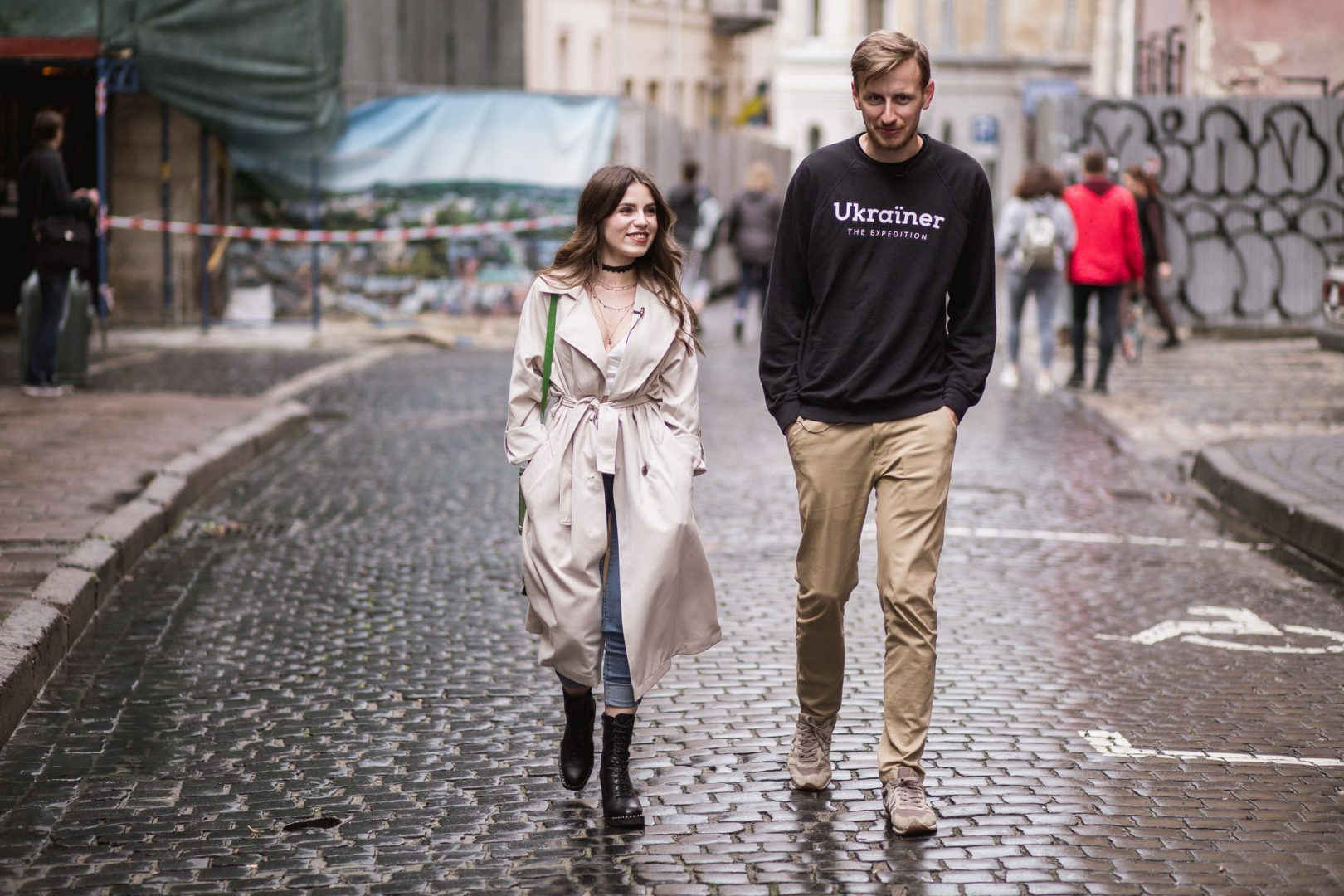
— Have you ever performed at the Rynok Square?
— Yeah, I think it was in 2016, my performance during Alfa Jazz Fest — it was an amazing concert.
— Drohobych has a Rynok Square too, doesn’t it?
— Yes.
— How are the Rynok Squares in Drohobych and in Lviv different? Is there anything that really shows they’re not the same?
— Well, the situation is very different there. It’s not so over-the-top, there’s less decoration, and everything is more modest and provincial.
— There’s no Italian Courtyard like in Lviv.
— No. On the doors there aren’t such beautiful grilles, or whatever they’re called. There are no cars. But it’s my hometown, and I love it the way it is, the way I know it. I grew up there. Maybe not because I grew up there, but because it really has some sort of magic of its own. There you can listen to yourself and realise what you want to do. And actually start doing it. In Lviv there’s a bit more movement. In Kyiv it’s even worse, I have big problems with that.
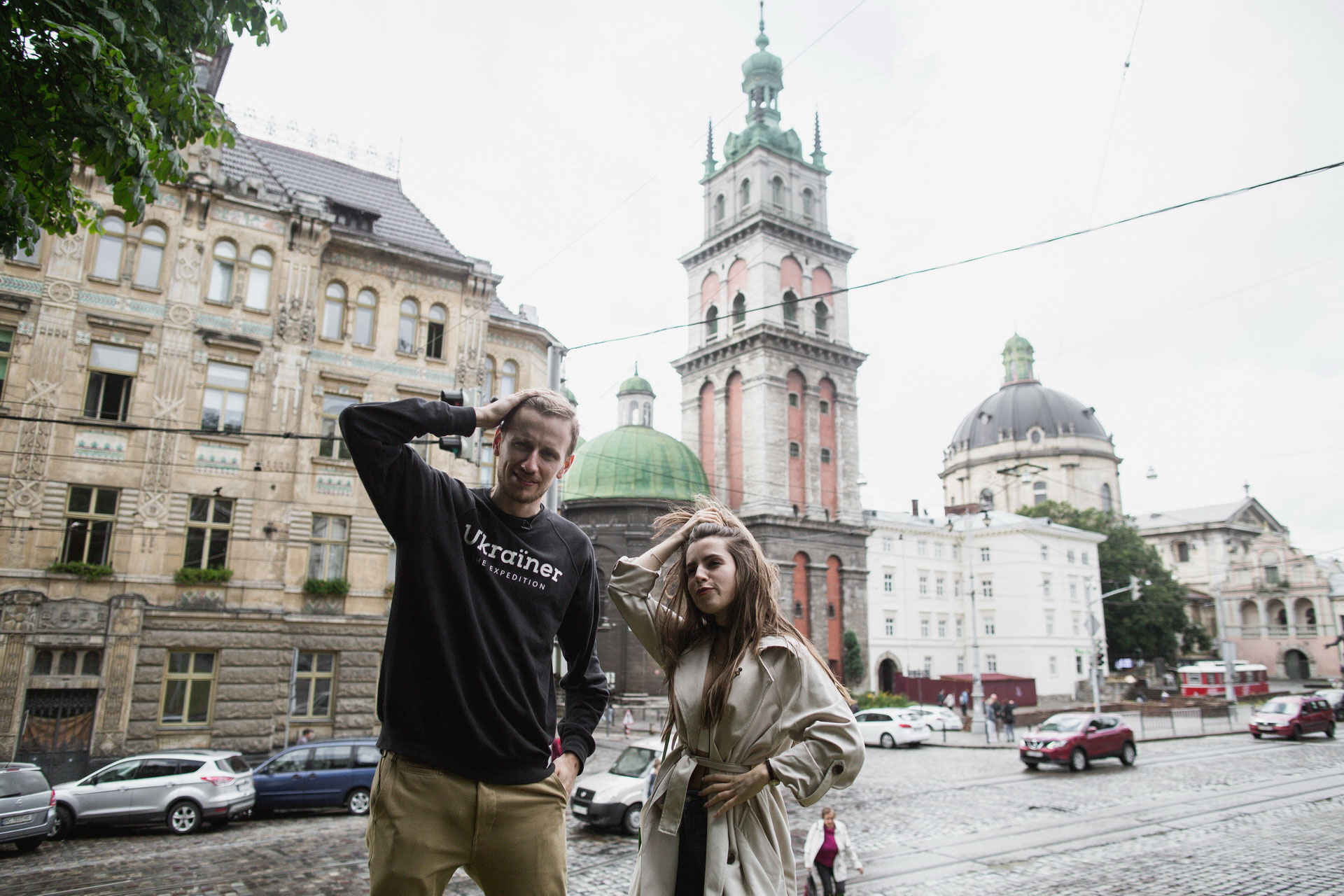
— What was your favourite place to eat in Lviv?
— I don’t know, there are so many places like that. Maybe most of all, the Bachevski restaurant. I like the way they serve mizeria there. It’s a dish that my granny used to make, and really loved to make.
Though she never made such an attraction of it as they do. Well, it’s an ordinary salad with cucumber or tomato, with sour cream, onion, some kinds of herbs. It’s just the way they serve it on such small plates, and they put them one on top of the other like a pyramid — well, it’s very attractive.
Each time you visit Lviv, you can discover it from new angles and new heights. Sometimes even the locals aren’t able to see the genuine old Lviv. Andrii Roiuk, one of Lviv’s urban explorers, is always looking for opportunities to get into difficult-to-access locations. It was some time before he got the chance to get inside the Korniakt Tower, which is part of the Dormition Church, but the view from the top was worth the effort.
— This tower was built in the 16th century, and was the tallest tower in Lviv in its time. This bell was cast in the 16th century. It’s been supported by two or three poles ever since the tower was built. If you think about it, there are all these different buildings, and each has its own history. Each building has its mysteries.
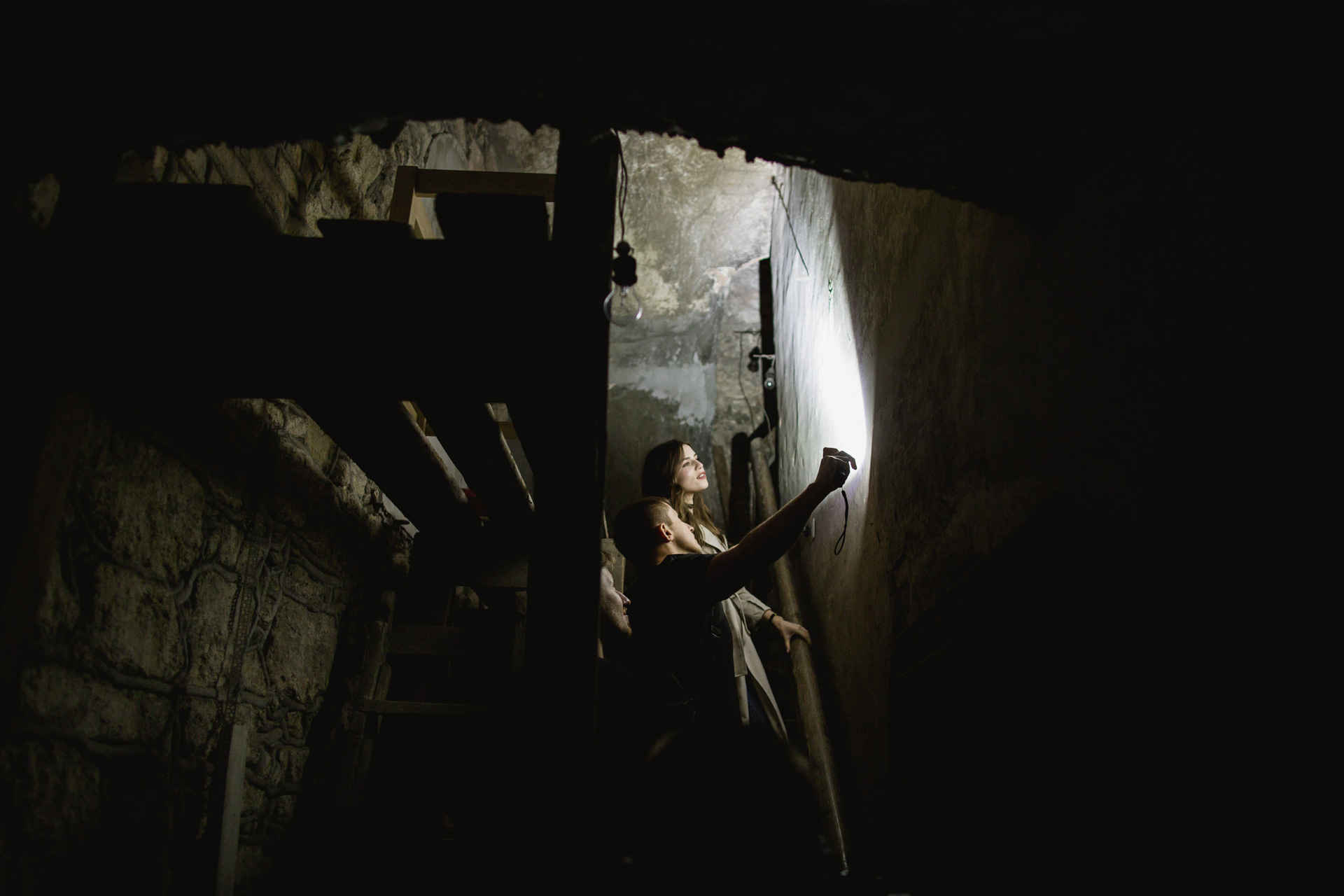
— Of the Ukrainian artists of recent years, is there anyone who has touched you? Is there anyone who is real?
— I like Alyona Alyona (Ukrainian rapper – tr.), she’s very real, even though it’s not my genre of music, but what she makes is touching and you feel it even if you don’t listen to that sort of music..
— Do you know her personally?
— Yeah.
— The lyrics of your songs are very poetic – I mean, they’re deeply metaphorical. And you studied in the philology department. Have you ever wanted to become a poetess?
— No, never. In fact, I never took poetesses seriously, except Lina Kostenko, Lesya Ukrainka or Sylvia Plath. That always seemed all sentimental to me, and this is exactly how my lyrics sound now.
— Are there any contemporary poets or poetesses you admire?
— I like Halyna Kruk. A poetess from Lviv, and my teacher, in fact. She organised a kind of literary club. At the university. I often met Ira Shvaidak (Ukrainian singer — tr.) there.
— You and Ira studied together?
— No, I think she’s two or three years older than me. But we had mutual friends and acquaintances, even though we never really spent time together.
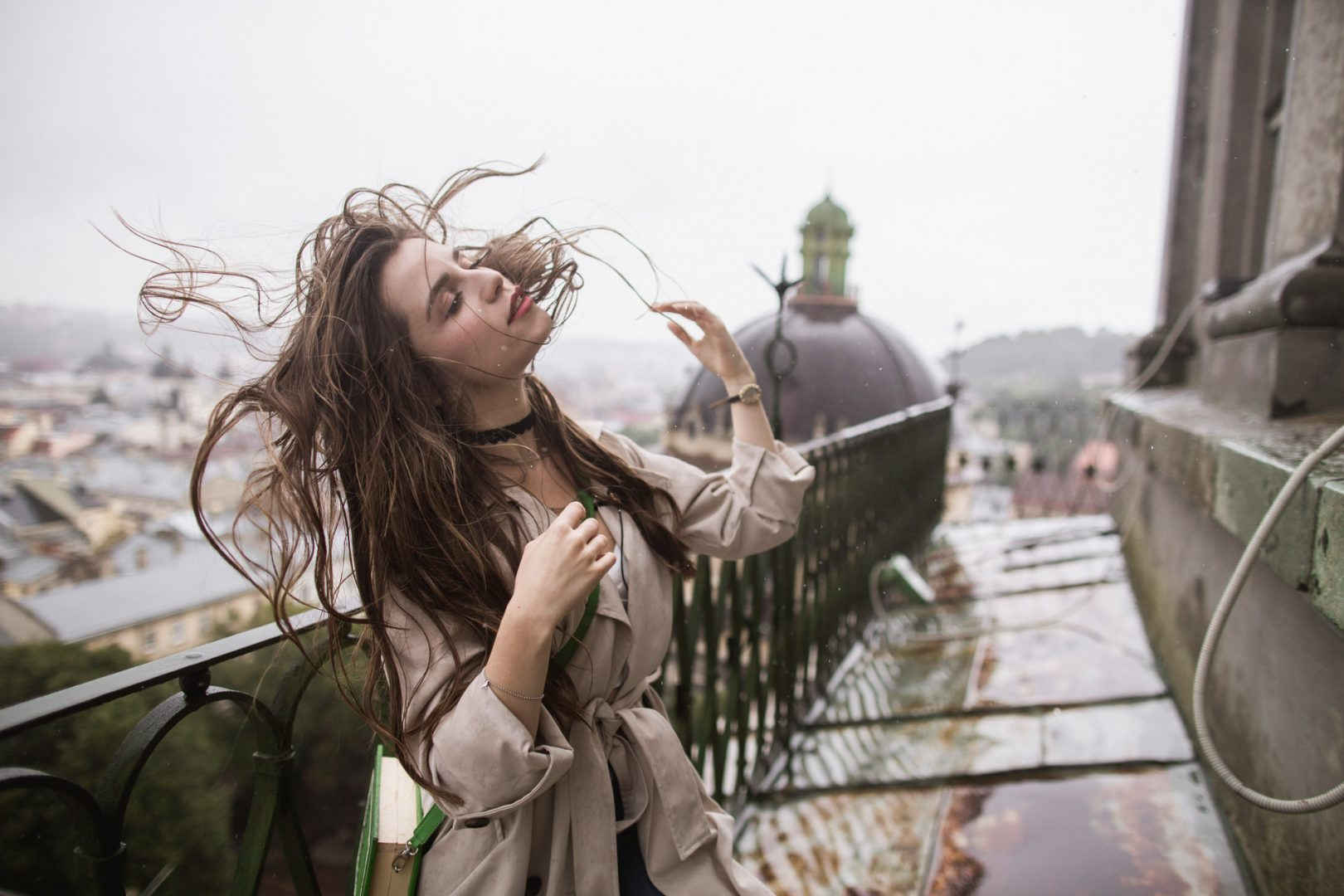
— Are you a fan of Odyn v Kanoe (Ira Shvaidak’s band — tr.)?
— I really like what they do. And I love them for managing to be themselves in spite of everything.
— Do you manage to be yourself?
— Me? I don’t know. Maybe to a smaller extent, because I’ve chosen a different path. I’ve become hostage to an image that wasn’t created by me. Well, this happened after The Voice, and in fact it often feels like people don’t see me the way I am, but rather through that image.
— We have this common (and, in my opinion, absolutely stupid) epithet for the Ukrainian language as a ‘nightingale’ language, right?
— I fit into this concept perfectly.
— You can even be hostage to your surname, you know. (‘Soloviy’ is Ukrainian for ‘nightingale’ — tr.)
— Both my name and my surname. (The name Khrystyna is common and traditional in Ukraine — tr.)
— Do you wish you were more brutal?
— Well, you know, I think I’m brutal enough, especially for people who are close to me.
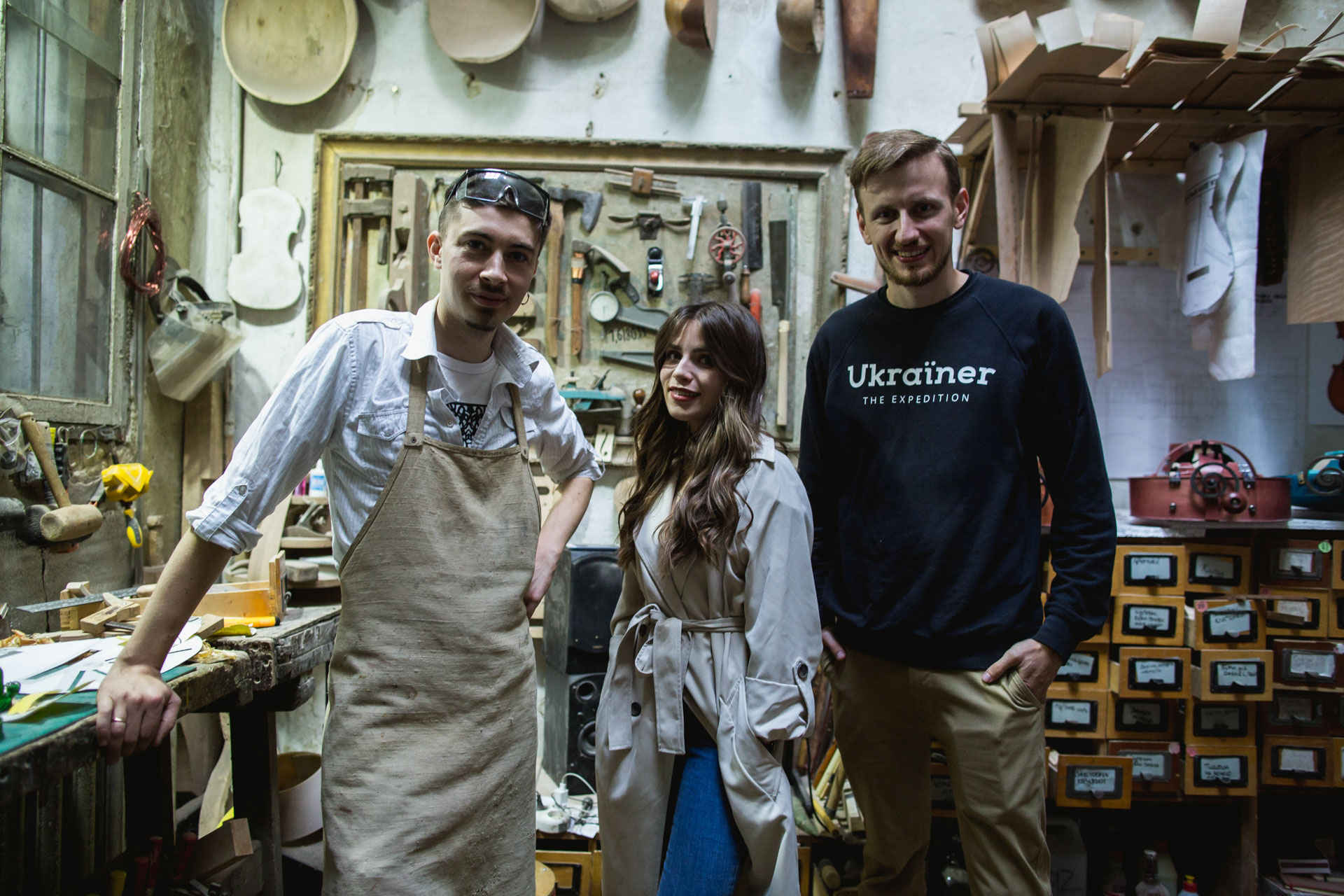
The workshop of the great sculptor Emmanuil Mysko is likely to become yet another tourist attraction in Lviv. His grandson, Hordii Starukh, a sculptor and a member of the band Lirwak, has managed to combine his biggest passions: music and sculpture. He makes lyres (Ukrainian wheel fiddles or hurdy-gurdies – tr.), rediscovering this lost art for Ukrainians.
— This instrument is a thousand years old. Well, it was first mentioned – pictured, that is – in Spain. There’s a temple where they have an image of two guys: one is spinning the wheel, and the other one is pressing the keys. Only the instrument was twice as big, it was called an ‘organistrum’, and was used as an ancient organ.
There were quite a lot of kobzars (itinerant Ukrainian bards — tr.) with lyres, even more than those with kobzas or banduras (other traditional instruments for kobzars — tr.), because the lyre makes a very loud noise. On our territory, the lyre was a sacred attribute for elderly beggars singing religious songs, spreading spirituality and epic poetry — about cossacks, for example.
At the same time in western Europe, brothels were banned, so in order to advertise themselves, although it was illegal, they would go out – the courtesans themselves went out with lyres. They didn’t even need to play them, they could just stand, but that was a clear sign that you were in the right place, you know. One instrument can have such different implications. For us, for example, some of our folklore researchers are so strictly sexist and traditionalist saying that it’s only for men. As for me, that’s rubbish. Nowadays so many people play lyres – it’s a global trend. It’s not only people in Ukraine who are interested in it — it’s becoming more popular around the world.
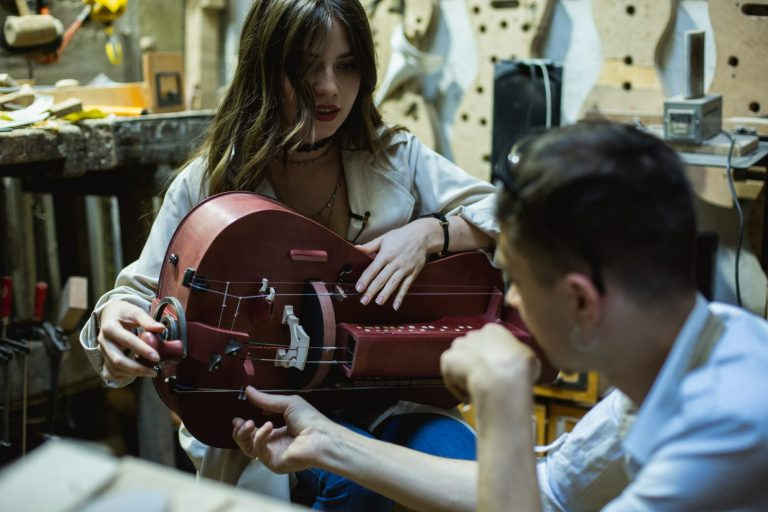
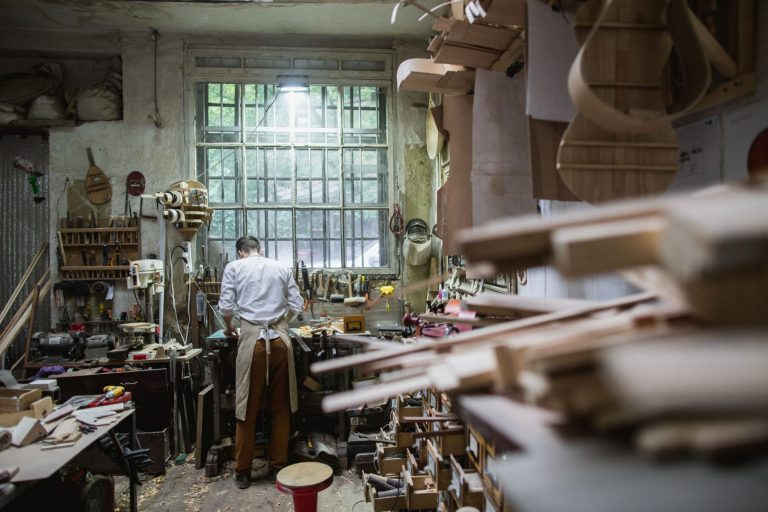
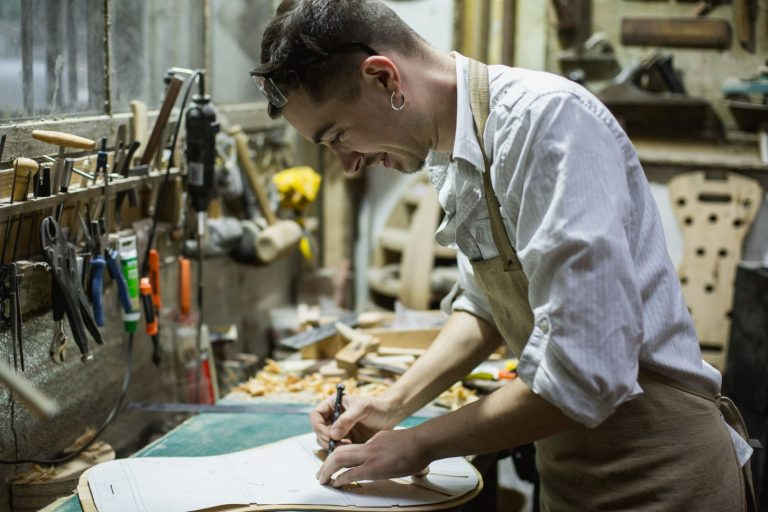
slideshow
It is common for Ukrainian musicians to be invited to join political parties, purely to attract voters. Organising free concerts is another ‘traditional’ method used during election campaigns. This way, if the voters like the celebrity, they are expected to automatically sympathise with the party the celebrity supports, whether it is a conscious choice or not.
— Lots of musicians, actors and showmen are going into politics these days. Did anybody encourage you to take part in these elections?
— I was asked to support some political parties with concerts, but I refused.
— Do you make decisions on your own?
— I discuss everything with my team, but normally if I’ve already made up my mind, I’ll just seek their support. But Sviatoslav (Sviatoslav Vakarchuk, a singer and Khrystyna’s producer — tr.) can often give me strong arguments to lead me to the right decision if I’m hesitating and can’t make up my mind. But this isn’t really about my art.
— Your personal life?
— We might say so.
— When did you last ask him for advice?
— Well, some time in spring, I guess, or at the end of February.
— Before the political campaign started.
— Yeah. After the campaign started, we hardly talked.
— Did he tell you he was going to run for the parliamentary elections?
— No, we aren’t so close that he would ask me whether or not to go into politics.
— But actually you’re the only one he’s producing and financing.
— Yes. We’ve got a contract.
— Is this a contract with him personally, or with Susy Production?
— With Susy Production.
— But in fact, concerning the last album, his role was strictly an advisory one, right? Did he even listen to the album at the last minute?
— He listened to the album at the last minute. And this has its own advantages and disadvantages. He always knows how best to reach the listener through music, how to make it understandable and at the same time preserve the ideas that you have when creating it. But, still, we have different views in this respect. So I may have been avoiding any long discussions on this. Anyway, we’ve already recorded one album together, and I think that for him it’s fair to leave me some freedom of speech and voice.
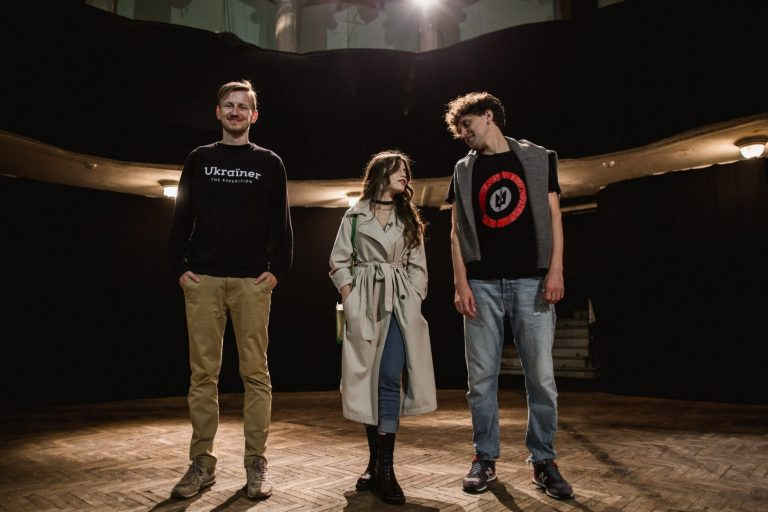
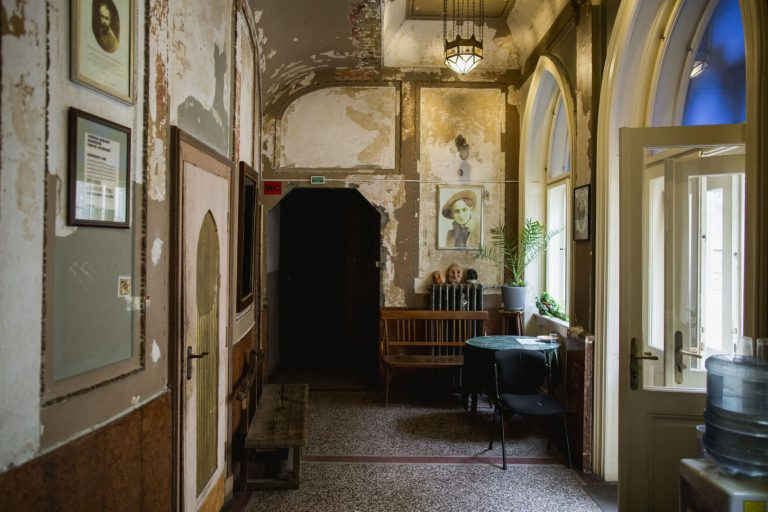
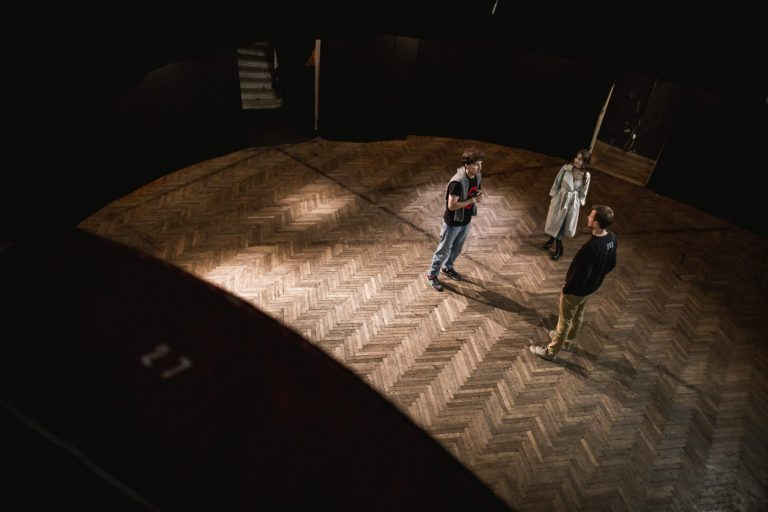
slideshow
— We’re now approaching the Les Kurbas Theatre, and it’s one of the places chosen by you. Why this place?
— I’ve defined it as a place which greatly influenced my life and my outlook. In fact, everything started in the Maria Zankovetska Theatre. We went to a play with my classmates from the faculty, I don’t remember which play. And there was a boy sitting behind me. After watching me for some time, he whispered in my ear, “I’ll show you real theatre today,” — and since then I’ve never been to the Maria Zankovetska Theatre again. And with that boy we came here for the very next play, and it became my favourite theatre. Here I saw Ecstasy Formulasfor the first time. I’ve seen that play at least five times since then, maybe more. I fell in love with the works of Antonych and fell even deeper in love with the Lemko songs, because they were in that play.
The building which today houses the Lviv Academic Les Kurbas Theatre was built as a variety theatre as early as the beginning of the 20th century. There was a cinema and a casino – the Casino de Paris – while the topmost floors of the building were occupied by the Hotel Belvedere. Mykola Bereza, actor and director of the theatre, supports these stories by pointing out the autographs on the walls, most likely left by those who worked here in variety shows. Today, the theatre has amassed legions of like-minded supporters and the company has grown into one of the best-known in Ukraine, as well as achieving recognition further afield.
— For me it’s a home. In the full sense of the word. And in the past it used to be my home literally. I actually lived here for quite a while. In the dressing room, in the corners, somewhere on the balcony, from my student years onwards. But this is also a home with its own unique father, Kuchynskyi, the art director of this theatre, who introduced a great methodology here which formed the basis for the theatre’s overall development and everything associated with it, everything combined with this compact hall, where the spectator can become part of the play, so I feel like something fairly unique is being created here.
